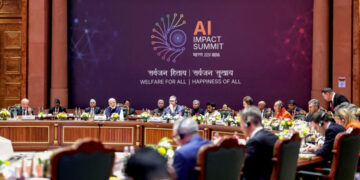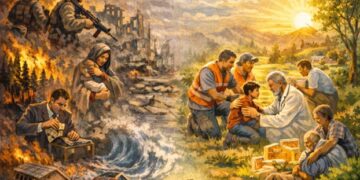Throughout history, philosophers and scholars have debated the role of religion in human life. Many argued that institutional religion curbs personal freedom and imposes conformity. This critique culminated in secularism, which sought to separate religion from the state, politics, and governance. Religion was redefined as a private matter, not to interfere with administration or public life.
Two seminal spheres of the state—education and politics—were deliberately alienated from religion. The prevailing belief was that religion’s influence on these domains would be harmful and unproductive. Yet, this separation has not produced the harmony or progress its advocates envisioned. Instead, it has led to serious repercussions: religion has been reduced to an instrument serving political and educational systems, rather than the other way around.
In modern democracies, politics has become the dominant force, often manipulating religion for its own ends. Politicians routinely invoke religious sentiments to mobilize voters, especially when other strategies fail. The “religion card” rarely disappoints in election campaigns. This inversion of roles has left religion powerless. Political authorities now possess the power to ban religious laws or practices, while religion itself remains helpless to curb political injustice. What was once a moral compass guiding governance has been relegated to a tool of expediency.
René Guénon foresaw this inversion when he wrote: “The real crisis is not political or social, but spiritual; it is the loss of principles that once gave meaning to civilization.” Politics, stripped of principles, becomes a theatre of manipulation rather than a service to humanity.
The educational system, too, has distanced itself from religion. Once envisioned as a means of moral and intellectual transformation, education now serves political interests and isolates itself from religious principles. In doing so, it has lost its essence. Education should cultivate disobedience to tyranny and non-conformism to injustice. Instead, it teaches submission and obedience. An educated person is expected to remain silent in the face of oppression, as society deems resistance inappropriate for someone “civilized.”
This distortion has produced graduates who are technically skilled but morally indifferent, informed but uninspired, credentialed but devoid of compassion. Knowledge has been reduced to a commodity, measured in degrees and positions rather than wisdom and transformation. Guénon described this decline as the triumph of quantity over quality: “The modern world has become a world of quantity, where quality is ignored or denied.” Education, once a path to wisdom, has been reduced to statistics, rankings, and credentials.
Religion’s marginalization has created a vacuum in public life. We now witness bad politicians and rude, immoral educated elites—products of systems that sought knowledge and power isolated from ethical and spiritual foundations. Politics, stripped of moral guidance, degenerates into a pursuit of power and money-making. Education, stripped of spiritual depth, becomes a factory of credentials. Neither sphere delivers positive change or human service. Both fail to uplift society.
The absence of religion has also eroded the sense of community. Where religion once bound people together through shared values of compassion and service, politics now divides them along lines of identity and interest. Education, instead of bridging differences, often reinforces hierarchies of privilege and exclusion.
The crisis we face today is not merely political or educational—it is civilizational. Religion, when understood in its essence, is not a barrier to freedom but a source of liberation. It teaches responsibility, compassion, and resistance to injustice. It inspires individuals to transcend selfishness and serve humanity. When politics serves religion, governance becomes ethical, just, and humane. When education serves religion, learning becomes transformative, nurturing both intellect and character. The alienation of these spheres from religion has robbed them of their higher purpose.
Religion must be seen not as a set of rigid laws but as a living force that nurtures humanity. It is the soil from which values like mercy, justice, and compassion grow. Without it, politics and education become barren fields, producing only power-hungry leaders and indifferent scholars. Guénon reminded us that even in times of confusion, hope remains: “Those who might be tempted to give way to despair should realize that nothing accomplished in this order can ever be lost, that confusion, error and darkness can win the day only apparently and in a purely ephemeral way.”
The time has come to re-examine the relationship between religion, politics, and education. Secularism sought to protect freedom by separating religion from public life, but in practice, it has produced a vacuum filled by corruption, manipulation, and moral decay. We must ask: should politics and education continue to operate in isolation from religion, or should they be reoriented to serve its ethical and spiritual vision? The answer lies not in returning to dogmatism or authoritarianism, but in rediscovering religion as a source of humanity, justice, and compassion.
Religion must reclaim its rightful place—not as a tool of politicians or educators, but as the guiding principle of both. Only then can politics rise above power games and education rise above credentialism. Only then can society recover its humanity.
History teaches us that when religion is marginalized, society loses its moral compass. Politics becomes tyrannical, education becomes hollow, and humanity suffers. The challenge before us is to restore balance: to ensure that politics and education serve religion, not exploit it. Religion, in its true essence, is not an obstacle to freedom but the foundation of morality, compassion, and justice. Without it, our systems produce leaders without conscience and scholars without soul. With it, they can become instruments of transformation, service, and renewal.
The choice is ours: continue down the path of alienation and corruption, or reorient our institutions toward the ethical vision of religion. Only the latter offers hope for a politics that serves people, an education that transforms lives, and a society that embodies humanity.
The writer is a columnist. azaadbhat28@gmail.com.




